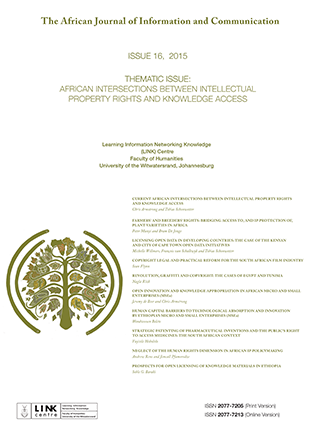Neglect of the Human Rights Dimension in African IP Policymaking
DOI:
https://doi.org/10.23962/10539/19318Keywords:
intellectual property (IP), human rights, public interest, development, Africa, access to medicines, access to knowledge (A2K)Abstract
In this thematic report, the authors, both members of the African Scholars for Knowledge Justice (ASK Justice) network, outline the neglect of human rights in IP policymaking; the need to end this neglect, particularly in the African context; and steps to be taken towards this goal.
References
African Commission on Human and People's Rights (ACHPR). (2008). Resolution 141 on Access to Health and Needed Medicines in Africa. 44th Ordinary Session, Abuja,10 to 24 November.
Baker, B. (2014, 18 January). US PhRMA bares its fangs - South Africa patent law reform and access to medicine at risk yet again. infojustice.org. Retrieved from http://infojustice.org/archives/31986
Dean, O. H. (1997). The case for recognition of intellectual property in the Bill of Rights. Journal of Contemporary Roman Dutch Law (THRHR), 60, 105-119.
Dean, O. H. (2015, 14 July). Intellectual property and the Constitution. Anton Mostert Chair of Intellectual Property (CIP) Blog, Stellenbosch University. Retrieved from http://blogs.sun.ac.za/iplaw/2015/07/14/intellectual-property-and-the-constitution/
Drahos, P., & Braithwaite, J. (2002). Information feudalism: Who owns the knowledge economy? London: Earthscan.
Geiger, C. (2015). Implementing intellectual property provisions in human rights instruments: Towards a new social contract for the protection of intangibles. In C. Geiger (Ed.), Research handbook on human rights and intellectual property (pp. 661-6). Cheltenham, U.K. Edward Elgar. https://doi.org/10.4337/9781783472420.00051
Gold, E. R., Kaplan, W., Orbinski, J., Harland-Logan, S., N-Marandi, S. (2010). Are patents impeding medical care and innovation? PLoS Med 7(1). https://doi.org/10.1371/journal.pmed.1000208
Helfer, L. R. (2003). Human rights and intellectual property: Conflict or coexistence? Minnesota Intellectual Property Review, 5, 47-61. https://doi.org/10.2139/ssrn.459120
International Covenant on Economic, Social and Cultural Rights (1966).
Minister of Health and Others v Treatment Action Campaign and Others, (No 2) (CCT8/02) [2002] ZACC 15.
Nwauche, E. S. (2005). Human rights-relevant considerations in respect of IP and competition law. SCRIPT-ED, 2(4), 467-484. https://doi.org/10.2966/scrip.020405.467
Oguamanam, C. (2014). Intellectual property: The promise and risk of human rights. In B. C. Doagoo, M. Goudreau, M. Saginur, & T. Scassa (Eds.), Intellectual property for the 21st century: Interdisciplinary approaches (pp. 343-346). Toronto: Irwin Law.
P.A.O & 2 OTHERS v Attorney General, [2012] eKLR. Retrieved from http://kenyalaw.org/caselaw/cases/view/79032
Reichman, J. H., & Okediji, R. L. (2012). When copyright law and science collide: Empowering digitally integrated research methods on a global scale. Minnesota Law Review, 96, 1362-1480.
Rens, A. (2011). Collateral damage: The impact of ACTA and the enforcement agenda on the world's poorest people. American University International Law Review, 26(3), 783-809.
Rens, A. (2015). Lessons to be drawn from the ACTA process: An African perspective. In P. Roffe, & X. Seuba (Eds.). The ACTA and the plurilateral enforcement agenda: Genesis and aftermath (pp. 211-224). Cambridge, UK: Cambridge University Press. https://doi.org/10.1017/CBO9781107707207.017
Republic of Kenya. (2008). Anti-Counterfeit Act 13 of 2008.
Special Rapporteur to UN OHCHR (2008). Human Rights Guidelines for Pharmaceutical Companies in relation to Access to Medicines. In Report of Special Rapporteur on the right of everyone to the enjoyment of the highest attainable standard of physical and mental health, Paul Hunt. Office of the High Commissioner for Human Rights (OHCHR). UN General Assembly 63rd Session, 11 August, New York.
Special Rapporteur to the UN OHCHR (2009). Report of the Special Rapporteur on the right of everyone to the enjoyment of the highest attainable standard of physical and mental health, Anand Grover. Office of the High Commissioner for Human Rights (OHCHR). Human Rights Council 11th Session, 31 March, UN General Assembly, New York.
Special Rapporteur to UN OHCHR (2015a). Report of the Special Rapporteur in the field of cultural rights Farida Shaheed: Copyright policy and the right to science and culture, Office of the High Commissioner for Human Rights (OHCHR). Human Rights Council 28th Session, 14 March, UN General Assembly, New York.
Special Rapporteur to UN OHCHR (2015b). Report of the Special Rapporteur in the field of cultural rights Farida Shaheed: Patent policy and the right to science and culture. Office of the High Commissioner for Human Rights (OHCHR). Human Rights Council 70th Session, 4 August, UN General Assembly, New York.
UN Committee on Economic, Social and Cultural Rights (UN CESCR). (2006). General comment 17: The right of everyone to benefit from the protection of the moral and material interests resulting from any scientific, literary or artistic production of which he or she is the author (article 15, paragraph 1 (c), of the Covenant). E/C.12/GC/17, 12 January.
World Intellectual Property Organisation (WIPO). (2013). Marrakesh Treaty to Facilitate Access to Published Works for Persons Who Are Blind, Visually Impaired or Otherwise Print Disabled.
World Trade Organisation (WTO). (1994). Agreement on Trade-Related Aspects of Intellectual Property Rights (TRIPS Agreement).
WTO. (2001). Declaration on the TRIPS Agreement and Public Health. Adopted by WTO Ministerial Conference, 14 November, Doha.Yu, P. K. (2007). Reconceptualizing intellectual property interests in a human rights framework. U.C. Davis Law Review, 40,1039-11469.
Downloads
Published
Issue
Section
License
Copyright (c) 2015 https://creativecommons.org/licenses/by/4.0

This work is licensed under a Creative Commons Attribution 4.0 International License.
How to Cite
- Abstract 316
- pdf 117


.png)